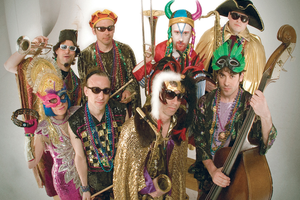Revolutionary Snake Ensemble - (USA)

Playing music that riotously combines the rhythms of New Orleans brass bands with improvisation and heaping undercurrents of funk, the Revolutionary Snake Ensemble inhabits that rare musical planet on which Sun Ra, James Brown, George Clinton & Parliament Funkadelic and a myriad of New Orleans marching bands jointly reside. Based in Boston, the horn and percussion-based group is led by saxophonist/composer Ken Field, who describes it as "a funk and street beat brass band, playing New Orleans and other modern improvised celebratory styles." Its repetoire brimming with up-tempo tunes steeped in the rhythms of Mardi Gras and New Orleans 'second line', including original works and arrangements of traditional songs, the Revolutionary Snake Ensemble celebrates, expands, and transforms the brass band tradition.
A saxophonist/composer/improviser, Ken Field is one of Boston's most dedicated and versatile musicians. Besides leading the Revolutionary Snake Ensemble, he is a longstanding member of Birdsongs of the Mesozoic and has an active solo career with 4 releases under his name. Field has composed music for animation, film and video; music for dance companies (Bridgman/Packer Dance), and done soundtrack work for television, including music for Sesame Street and PBS. As a performer, he has worked as a sideman with countless renowned reggae, funk, R&B, rock, jazz and world beat artists – and played a gig for former President Bill Clinton. Field is also the long-standing radio host of The New Edge, a Boston-based weekly radio show.
Field founded the Revolutionary Snake Ensemble in 1990, and its performances of wildly upbeat music by costumed musicians (feathered masks and sequined robes from a wardrobe shared by Mardi Gras and Sun Ra!) quickly became one of Boston's most-beloved 'events'. They've played literally hundreds of shows in Boston, everywhere from private parties (re-arranging a Billy Idol/William Broad tune for a White family wedding), to music clubs, and to Boston institutions such as Harvard University and the Boston Museum of Fine Art. In addition, the band has repeatedly been nominated for local music awards (Boston Music Award, Boston Phoenix, WFNX Radio. The Revolutionary Snake Ensemble also preforms in NY (The Stone, Tonic, Brooklyn Academy of Music, the Puffin Cultural Forum), Washington, DC. (John F. Kennedy Center for the Performing Arts, Millenium Stage), and New Orleans (Mardi Gras parade). In a unique arrangement with Amtrak from 2004-2006, the Snakes began an annual pilgrimage to Mardi Gras on Amtrak's Crescent train, performing their music en route and marching in the Mardi Gras parade with the Krewe of Muses.
The Revolutionary Snake Ensemble has two albums: Year of the Snake (Innova: 2003), which included "Parade of Numbers", originally recorded for Sesame Street, a children's television show, and Forked Tongue (Cuneiform: 2008). Forked Tongue includes unique arrangements of traditional New Orleans marching music and spirituals and of original music. The album features Field on alto sax, whistles and percussion; Andrew Hickman on tenor saxophone, Jon Fraser on trumpet, Lennie Peterson on trombone, Kimon Kirk on acoustic bass, and on drums and percussion, both Erik Paull and Phil Neighbors (who also contributes electric bass). Guest musicians include vocalist Gabrielle Agachicko performing Field's stunning minor key arrangement of the traditional classic "Down By the Riverside." Other guests include Karen Aqua (djembe, tambourine), Andy Pinkham (electric bass), and Jesse Williams (bass). While usually averaging 7 members, the ensemble's lineup and size shifts. Notable musicians who have performed as part of RSE through the years include Dana Colley (Morphine), Jesse Williams (Al Kooper/Duke Robillard), Russ Gershon (Either/Orchestra), Eric Paull (DJ Logic, Clem Snide), Ken Winokur (Alloy Orchestra), Charlie Kohlhase (John Tchicai/Leroy Jenkins/Anthony Braxton), Jim Prescott (G Love & Special Sauce), Kimon Kirk (Aimee Mann, Session Americana), Scott Getchell (Lars Vegas, Skull Session), Dave Harris (Naftule's Dream, Les Miserables Brass Band), and Bob Pilkington (Chandler Travis Philharmonic).
Revolutionary Snake Ensemble - "Just a Closer Walk (Excerpt #2)"- full track= 5:19
The mournful sound of a brass band churning out a slow-rolling hymn switches gears to become a foot-stomping, Dixieland-style free-for-all, evoking that classic dichotomy between sadness and celebration you find at traditional New Orleans funeral marches. [Tempo: no fixed tempo]
Revolutionary Snake Ensemble - "Slots (Excerpt #1)"- full track= 2:44
A slippery, syncopated funk groove weaves its serpentine way through a field of brass that combines R&B riffs with avant-jazz harmonies. [Tempo: Mid-tempo]
Revolutionary Snake Ensemble - "Little Liza Jane (Excerpt #1)"- full track= 5:39
With a rhythmic framework that’s a cross between New Orleans second line and Bo Diddley (plus a little African-sounding tuned percussion), a brass band bangs out a folk song adaptation that’s more fit for Bourbon St. than the back porch. [Tempo: Mid-tempo]
Revolutionary Snake Ensemble - "The Large (Excerpt #1)"- full track= 4:30
Slinky, funk-based grooves churn beneath soulful, jazzy riffing from horns that dart in, around, and out of each other’s paths with abandon. [Tempo: Mid-tempo]
Revolutionary Snake Ensemble - "Give Me Jesus (Excerpt #1)"- full track: 2:18
A brass band gives an old-school New Orleans street parade treatment to a traditional hymn, complete with a steady, strolling beat and raw-but-righteous statements from the horns. [Tempo: Down-tempo]
Revolutionary Snake Ensemble - "Down By the Riverside (Excerpt #1)"- full track= 7:03
A sensual, snaky, somewhat Cuban-sounding groove is given to a traditional spiritual tune, as the bass and drums shimmy beneath horns that walk a line between spiritual and slightly sleazy, with female vocals adding dashes of jazzy bluesiness to the proceedings. [Tempo: Mid-tempo]
Revolutionary Snake Ensemble - "Minor Vee (Excerpt #1)"- full track= 5:14
A modified New Orleans second-line rhythm propels a brass section’s moody harmonies and the horns’ overlapping latticework of minor-key riffs, for a foreboding but subtly funky feel. [Tempo: Mid-tempo]
Revolutionary Snake Ensemble - "Under the Skin (Excerpt #1)"- full track= 3:00
A propulsive, syncopated beat is the foundation supporting a heavy tower of brass, full of horn riffs rich in angular harmonies, for a quirky, percolating sound that’s just this side of frenetic, though the implied chaos remains (barely) controlled. [Tempo: Mid-tempo]

